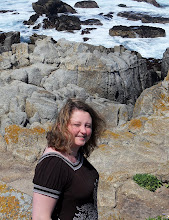On Wednesday and Thursday, I attended the Librarian as Instructional Leader Grant Workshop on the campus of Seattle Central Community College. I was invited by awesome Tacoma Community College librarian Rachel Goon, whom I've been working with in some small ways about how we can better incorporate the library into fully-online classes at TCC. She viewed this workshop as a potential way to explore those ideas further. Though the conference was for Washington community college librarians, particularly, each library was encouraged to invite discipline faculty along.
Rachel and I definitely got the chance to brainstorm together about ways to focus on TCC specifically, but it was also eye-opening to me just to see more about how librarians work and think, behind the curtain. I've always been of the impression that librarians are secret magic wizards, and these two days further solidified those beliefs.
To recap, here are some things I think it's helpful for faculty members to be aware of...
- librarians have to deal with almost every assignment we create. Of course I knew this on a cognitive level, but hadn't really considered this in a practical way. They have to be able to figure out how to approach every assignment in order to guide students on how to complete it. This means they know what good assignments look like, and what bad ones do, too. Having a librarian on hand to run assignment ideas by BEFORE distributing an assignment to students would be a very, very practical matter.
- librarians have a lot of ways to help students, even from a distance. I've only recently become aware of "pathfinder" help guides that librarians routinely create, as a guide for researching for a specific discipline, topic, or class. These are published online, so students can access them anytime it seems appropriate, no matter where the physical library is in relation to them. I get the impression that at TCC, at least, librarians are happy to create specific guides upon instructor request. How useful this would have been to know as an adjunct, as a way to harness the librarians' expertise in a meaningful way exactly when students need it.
- librarians love playing with technology to reinforce learning. We saw demonstrations of flip camera presentations, Jing videos, Delicious implementation for academic databases, Prezi shows, and wikis. This particular workshop repeatedly asked the question about whether standard practices of libraries and librarians encouraged "deep learning" on the part of the students they served. In many cases, the traditional way of doing things no longer seems to provide the best outcome, since publishing information has become so wide-spread and freely available. Showing students how to find information is no longer a problem. How to find the BEST information is. Technology can answer some of those challenges.


